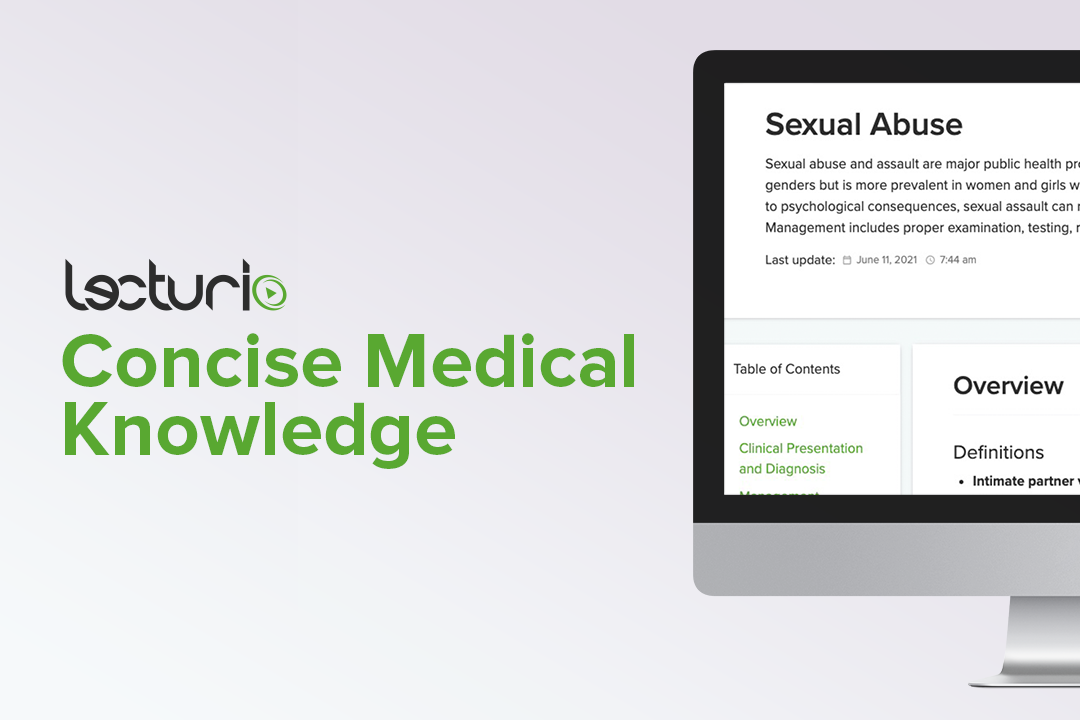Playlist
Show Playlist
Hide Playlist
Sexual Assault
00:01 Let’s now talk about sexual assault. Sexual assault is a crime of violence and aggression. 00:08 Sexual assault can range from anything from unwanted kissing, touching, fondling, all the way to penetration and rape. Let’s now talk about the different types of rape. 00:20 Rape essentially has different definitions depending on the age of the patient and the acquaintance of the patient with the perpetrator. Acquaintance rape or date rape is sexual assault committed by a known person to the victim. That is to say, a patient may go on a date and unexpectedly be assaulted by the person that she is dating. Statutory rape is different. 00:45 This is more of a legal definition. This is consensual sexual intercourse with an individual who is younger than a specific age. This varies from state to state. I would like to tell you that rape and sexual assault is very common. 1.3 million rape-related physical assaults have occurred in women in the US annually. Those are just the ones that are reported. 01:08 Nearly 80% of women reported they were first raped before the age of 25, with 42% reporting that they were raped before the age of 18 making adolescents particularly vulnerable. 01:21 Among female victims, 51% reported that at least one perpetrator was a current or former intimate partner, 41% reported that the assault was perpetrated by an acquaintance, and 13% reported a family member, and 14% reported a stranger. I would now like to talk about a special population, female veterans. These women are exposed to an increased risk of sexual assault due to their vocation. Female veterans make up 12% of the whole entire veteran population. 01:55 These women experience increased rates of sexual assault during their time in the military as well as when they are a civilian. These women are eligible to receive lifetime care at VA hospitals. 02:05 There may be some special problems related to sexual assault during their military service. 02:12 Let’s now review what ACOG recommends for the evaluation of sexual assault victims. 02:19 There should be an understanding that there could be medical issues associated with sexual assault as well as legal issues. Now, I’d like to talk to you about the recommendations for sexual assault evaluation. One, if a patient presents to the emergency room stating that they've been sexually assaulted, you have to obtain their consent to do an evaluation. 02:43 They should also be assessed and treated for physical injuries. We should do a thorough GYN history as well and perform a physical examination including a pelvic examination with a chaperone. 02:57 You should also obtain specimens and serology for STI testing and provide appropriate coverage for infectious disease prophylaxis as indicated. If the assailant's HIV status is unknown, you should evaluate the risks and benefits of actually giving PrEP or postexposure prophylaxis. 03:18 You should provide a range of provisions for emergency contraception as indicated. 03:24 We should counsel these patients regarding their findings and their prognosis. 03:29 You should definitely arrange for follow-up for medical care and referrals for psychologic counseling as needed. Let’s now talk about some of the legal issues. You should provide accurate reporting of events as this may actually be involved in a case later on. 03:44 You should document injuries, their location, and their quality. You should collect samples as indicated by local protocol or regulation. You should check with your institution. 03:55 They usually have a printed protocol to do this. Remember to identify the presence or absence of sperm in vaginal fluids and make appropriate slides. You should definitely report assault to authorities as required by state law. You should ensure the security of the chain of evidence as tampering can sometimes complicate legal issues for these patients. Let’s now talk about screening. 04:22 ACOG recommends that healthcare providers routinely screen all women for a history of sexual assault paying particular attention to those who report pelvic pain, dysmenorrhea, or sexual dysfunction, i.e. dyspareunia. Early identification of victims of sexual assault can lead to prevention of long-term and persistent physical and mental health consequences of abuse. Remember that patients may be reluctant to disclose abuse but may disclose symptoms that relate to the abuse. 04:53 I would now like to talk about the psychologic sequelae that we find in women who have been victims of intimate partner violence and sexual assault. These women often suffer from low self-esteem. 05:05 Low self-esteem is caused by the constant humiliation and belittling they may be subjected to. 05:11 Post-traumatic stress disorder can occur with any type of assault but it especially is associated with veterans who've had sexual assault during their military career. These women may also suffer from generalized anxiety disorder and mood swings, making it difficult for them to maintain good interpersonal relationships with others. Substance abuse is also very common in this population as a way to actually ease their psychological pain and emotional pain that they may be suffering from. Let’s now review a case. This is actually a case of mine. 05:46 I had a 27-year old G0 who presented to my office with primary infertility. Her record stated that she had to be sedated for a Pap smear. At the time of her physical exam, she declined a speculum exam and a digital exam. What about her behavior should alert you to discuss intimate partner violence and sexual assault? I’ll give you a moment to think about that. 06:13 Let’s now review. Typically, women do not need to be sedated for a Pap smear. 06:21 It’s not exactly comfortable but sedation is overkill. That should alert you. Also, you should be alarmed that something is wrong because she declines a vaginal exam. Also, this is very common in women who’ve had a history of assault or rape. So, you should screen this patient but you should screen every patient. How often do you think you should screen for intimate partner violence or sexual assault? I’ll let you take a minute to think about that. Here’s the answer. You should screen at every encounter regardless of the patient's socioeconomic status, ethnicity, or relationship status. 07:09 Thank you for listening and good luck on your exam.
About the Lecture
The lecture Sexual Assault by Lynae Brayboy, MD is from the course Female Pelvic Medicine.
Included Quiz Questions
What is the definition of statutory rape?
- Consensual sexual intercourse with an individual who is younger than a specific age
- Sexual assault committed by someone known to the victim
- Sexual assault by a stranger
- Consensual sexual intercourse outside of marriage
Which of the following is NOT a recommended component of the medical evaluation of a victim of sexual assault?
- If the assailant's HIV status is unknown, immediately administer post-exposure prophylaxis
- Conduct a complete physical exam, including a pelvic exam, with an appropriate chaperone
- Assess and treat physical injuries
- Obtain informed consent prior to conducting a medical evaluation
- Arrange follow-up medical care and referral for psychosocial needs
How often should providers screen for intimate partner violence and sexual assault?
- At every encounter
- On the first encounter only
- Only as needed based on symptoms
- Randomly screen patients
- Annually
Customer reviews
5,0 of 5 stars
| 5 Stars |
|
1 |
| 4 Stars |
|
0 |
| 3 Stars |
|
0 |
| 2 Stars |
|
0 |
| 1 Star |
|
0 |
WELL PRESENTED lecture. Understanding the concept of sexual assault well explained




